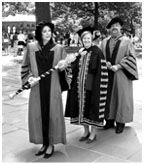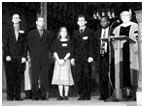
 October
8, 2003:
President's
Page
October
8, 2003:
President's
Page
Photos: RIght: Shirley M. Tilghman with Faculty Marshals Sandra L. Bermann (comparative literature) and D. Vance Smith (English). Below: At Opening Exercises, Dean of the College Nancy Weiss Malkiel (right) recognized five undergraduates for exceptional academic achievement (left to right): Tudor Dan Dimofte ’04, a native of Romania, majoring in mathematics; André Botelho Kurs ’04, a native of Sao Paulo, Brazil, concentrating in physics; Mihai Manea ’05, whose home town is Galati, Romania, planning to major in economics; Ruth Ilana Tennen ’04, a resident of Connecticut, concentrating in molecular biology; and Dan-El Padilla ’06, from New York City, who plans to major in classics.
On September 7 the University officially began a new academic year at
Opening Exercises in the Chapel. The following is excerpted from my address.
In trying to formulate the message that I wanted to convey this year,
I thought I might benefit from
some advice from a critic—in this case, my own daughter Rebecca,
who graduated last spring in the Class of 2003. I asked her to tell me
what she would like to have been told at the beginning of her Princeton
career, instead of having to learn it through the school of hard knocks.
 Her first
suggestion was a lament—I was to warn you that the next four years
will fly by at warp speed, and that Princeton will forcibly and cruelly
cast you out the FitzRandolph Gates well before you are ready to leave
of your own accord. If past is prologue, I can safely predict that the
next four years will be among the happiest and most transforming years
of your lives, but they will also be the most fleeting. So make the most
of them.
Her first
suggestion was a lament—I was to warn you that the next four years
will fly by at warp speed, and that Princeton will forcibly and cruelly
cast you out the FitzRandolph Gates well before you are ready to leave
of your own accord. If past is prologue, I can safely predict that the
next four years will be among the happiest and most transforming years
of your lives, but they will also be the most fleeting. So make the most
of them.
The second thing Becca wished she had known at the outset was that everyone
feels intimidated and daunted in their first months at Princeton. All
of you have excelled in high school at something—certainly in your
academic pursuits, but also in singing, acting, checkmating, running,
dancing, debating, writing, leading … and countless other activities.
Suddenly here you are in a class where everyone has excelled at something,
and some have excelled at many things. This is one of the most difficult
adjustments you will have to make in your life, but it may help to know
that everyone is feeling exactly the way you do. It may also help to recognize
that over your years here you will befriend many of these remarkable classmates,
and that both you and they will grow enormously from living and learning
with each other.
The breathtaking beauty of the campus landscape and the medieval echoes
of its gothic architecture might give you the impression that you have
arrived at an ivory tower, where ideas and learning can be pursued in
isolation from the hurly burly of the modern world percolating just outside
our gates. I hope this image will hold some truth for you—that you
will find times here to become lost in a world of thought; that you will
find ways to transport yourselves mentally to other times and other cultures;
that you will explore ideas that, at least at first blush, seem wildly
impractical, or even fully divorced from reality. Think in the 10-dimensional
string theory world, for example, or imagine a Utopian society in which
war is a thing of the past. One of the very important roles that universities
play is providing safe spaces where students, and faculty, can dream their
impossible dreams and create their alternate realities.
As compelling as this role might be, however, it does not tell the full
story, for modern research universities are decidedly not ivory towers,
nor would we want them to be. They are very much “of the world”—in
fact, they shape the world through the students they educate, the knowledge
they discover, and the ideas they generate. The research conducted by
faculty and students aims to reveal insight and to find solutions to pressing
problems that range from discovering the molecular basis of cancer to
inventing new computer algorithms for air traffic control. It seeks to
provide new insight into great works of art, uncover the meaning of historical
events, propose global governance strategies, devise better heath care
policies, and address thousands of other issues that confront us as a
nation and as a global society. Universities are essential if we are to
meet a broad range of human, social, scientific, environmental and other
needs; to fulfill their missions universities must engage the world through
their scholars, their students, and eventually their alumni.
This vision of the University is reflected in the Rights, Rules, Responsibilities
handbook that each of you received this summer. Its first sentence states:
“The central purposes of a University are the pursuit of truth, the
discovery of new knowledge through scholarship and research, the teaching
and general development of students, and the transmission of knowledge
and learning to society at large.” These fundamental purposes—research,
teaching and the dissemination of knowledge for the benefit of society—form
a seamless continuum, so tightly interlocked at the best universities
that it is not possible to tell when one stops and the next begins. The
linkage between teaching and the pursuit of knowledge is especially evident
at Princeton, beginning with the freshman seminars where you will work
through challenging research questions with distinguished faculty members,
and extending through the preparation of your original senior thesis or
Ph.D. dissertation. Linking learning and research requires an engaged
mind, a curious mind, an open mind, a persistent mind. When you take an
active part in your own education, rather than passively absorbing information,
the experience can be exhilarating.
Let me illustrate this point with my own experience as an undergraduate
chemistry major at Queen’s University in Ontario, Canada. My organic
chemistry professor asked me to explore whether anhydropenicillin, an
inert chemical, could be converted into biologically active penicillin.
To this day penicillin remains one of the most powerful antibiotics we
have to combat bacterial infections, but at the time the only source of
the drug was the penicillin mold made famous by Sir Alexander Fleming,
who won the Nobel Prize for his discovery. If we could develop a strategy
to synthesize penicillin in the laboratory, we could potentially improve
the purity of the drug and reduce its price to consumers.
I spent the semester trying to effect the conversion using an infinite
variety of concentrations, solvents, temperatures, salts, incubation times,
all to no avail. Then one morning I arrived in the lab to discover that
the lawn of bacteria on which I tested the outcome of each chemical reaction
was not growing as usual. Instead, there was a clearing in the lawn where
the bacteria had been killed. The hair on the back of my neck stood on
end, and my heart started beating wildly. I experienced the joy that comes
from discovering something, and on that day I knew I would become a scientist.
This, of course, was not the end of the story. The next step was to take
out a patent on the reaction conditions, which my professor did, and to
take great satisfaction—but alas earn not one penny—as a pharmaceutical
company then turned the laboratory-scale experiment into an industrial-scale
process.
As Rights, Rules, Responsibilities states, our goal is not simply to
discover new knowledge; we also have an obligation as a university to
encourage the application of knowledge to help meet the challenges of
the world in which we live and to help meet the needs of those with whom
we share this precious planet. This is why our faculty and students publish
books and papers, write op-ed pieces and columns in newspapers, give public
lectures, advise members of local, state, and federal legislatures, speak
to primary school students and senior citizen groups, and work with companies,
governments, civil society organizations, advocacy and public interest
groups, and other entities that have the capacity to effect positive and
meaningful change.
Princeton’s commitment to being “of the world” rather
than apart from it is embedded in our informal motto “Princeton in
the nation’s service and in the service of all nations” …
and it captures a bedrock value of this University that can be traced
back to its founding, one that fundamentally contradicts the image of
the University as an ivory tower: the obligation to put one’s education
to good use in the service of others. This expectation dates back at least
as far as Samuel Davies, Princeton’s fourth president, who told the
graduating class in 1760, “Whatever be your place, imbibe and cherish
a public spirit. Serve your generation.”
As was the case for the Class of 1760, at the brink of the American Revolution,
your generation is coming of age at a time of great unrest and uncertainty
in the world. The challenges we face as a nation and as a global community
are truly daunting, and they will require civic engagement throughout
your lives. As citizens
of the world who will have had the privilege of receiving an excellent
education, your responsibility will be particularly great. Just consider
some of the most pressing issues that will need resolution in the years
ahead: The gap between the richest and the poorest nations is increasing,
whether one measures level of education, the quality of health care, life
expectancy, or family income, as is the gap between the richest and the
poorest in this country. As a consequence, the world is a more unequal
place today than it was a century ago. HIV-AIDS has become a global epidemic
whose impact is being felt around the world, and especially in impoverished
areas of sub-Saharan Africa where an entire generation is being lost.
“Think globally, act locally” is only partially effective as
a strategy for preserving the quality of our environment, as ecological
catastrophes in one part of the world are felt at great distances. And
we all have to do a better job of addressing both the causes and the manifestations
of terrorism around the globe.
As you assume the mantle of a Princetonian, I hope you will embrace the
vision of Princeton “of the world” and respond with a passion
to serve. By doing so you will be following in the footsteps of extraordinary
individuals who have come before you, who have devoted their lives to
the service of this and all nations. As of today, you become a part of
a proud heritage, but one that can only be sustained by your own actions.
Let me express my hope that the year ahead will not only meet your expectations,
but surpass them. May it challenge you and surprise you. May it introduce
you to new ideas and new friends. May it give you abundant opportunity
to explore and learn and think and grow, by yourselves and in the company
of the others who
are arriving with you, or who are already here and, I am sure, join me
in wishing you a warm welcome.
![]()
